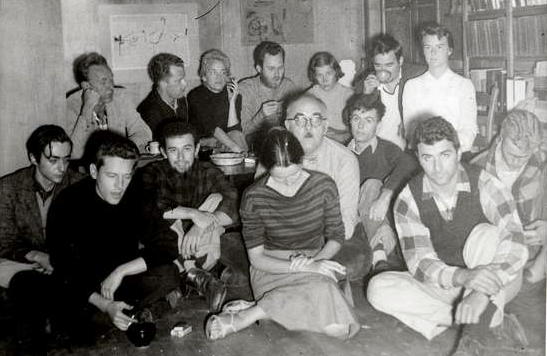Charles Olson, I noted a week ago Thursday, insists on being taken as a crank. The fourth section of Proprioception, a page and a half to sum up “Theory of Society,” underscores my point. It begins with this assertion, in parentheses & all in lower case:
(we already posses a
sufficient theory of
psychology)
Much of what follows can be read as an assault on one of the “hip” biases of the late 1950s & beyond (versions of which exist today, no doubt), that everything is interesting, at least potentially. Olson calls this “the greatest present danger / the area of pseudo-sensibility.” What follows the colon that ends that line sounds like a direct assault on, of all things, Oulipo, or perhaps Fluxus, movements that began coincidentally in 1960 & ’62 respectively, the exact period of Proprioception.
games
randomness
haphazard
(I Ching-
ness)
Olson decidedly is opposed to the idea that “anything goes or / all is interesting Or / nothing is.” Proprioception is the era of the
It’s interesting also to think of what Olson means by already possessing “a / sufficient theory of / psychology.” Olson is often treated as if his interest in the evolution of psychology in the 20th century were largely limited to Jung, though in fact he refers at different points to many of the major writers & will, literally on the next page, present us with a garbled version of Anna Freud’s concept of the stages of psychological development.
But if you look to Maximus, both the poem & the figure – one of two great instances of persona from the poets of the 1950s (John Berryman’s being the other) – you don’t see Olson interested in exploring the historic Maximus so much & certainly not his own motivations, but rather the idea of the self looking out into the world & acting thereon. “Society” here means, I think, exactly that.
So Olson is not, repeat not, interested in sitting still for 4’33” meditating on ambient noise & calling it music. Olson’s piano, where he to compose for such, would certainly be over prepared. Here he offers what he sees as the alternative to the “everything is groovy, dude” worldview:
instead of novelty (“God is the organ of
novelty”
This is at least the third time in Proprioception that Olson has pointed to the new as the pivotal question confronting not just poets, but anyone who seeks to make sense of the world. What is it about the nature of the world that the new occurs? Why isn’t, say, the steady state that would apply if the so-called natural cycles didn’t lead to some kind of perfect equation of beings all in harmony, the food chain operating as smoothly as gears? What is it about the world that, always, N = N+1? And the corollary question: which one? Which is what I take Olson to mean when he says in the next three lines that “the true cast of / the sensible / probability.”
In the next stanza – Olson’s critical prose doesn’t quite get to paragraphs – Olson takes off against “kicks,” phoney (sic) disaffection – anticipating here the “turn on, tune in, drop out” messages of Mr. Leary just a few years down the line. The one-time Democratic party activist Olson takes what is almost a Frankfort School line against such an attitude, seeing dissociation from the political as “the elite among / the masses accomplishing / a lateral coup d’état.” Adorno couldn’t have put it more succinctly.
Olson’s straw man, here, never fully figured as such, comes close to Milan Kundera’s portraits of aesthetes in Eastern Europe during the bad old days of Actually Existing Stalinism, where people turn to any kind of hedonism, from sex to art to food, so as to develop a code of civilization that will buffer them from having to confront the depredations of the real.
Olson then advances one of his pet theories, that people become identified with the point at which they “fall off” from keeping attuned to the new:
Some fell off at 5 etc some at
17 others 40, like No matter, they
are bombers (carrying forces) of the time
they fell off, not what
they look like talk like
seem etc Or are
taken as
It is this that Olson contrasts with Anna Freud’s developmental phases (infancy, libidinal, oedipean, etc.), a world that was healthier because “rites / de passage existed.”
Opinion
has replaced all such






